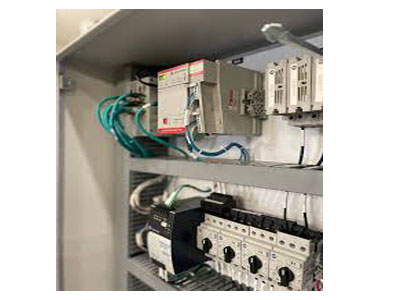What Is The Impact Of AI On Control Panel Systems?
Key Takeaway
The impact of AI on control panel systems is transformative, enhancing efficiency, reliability, and intelligence across industrial operations. By incorporating AI and machine learning (ML), control panels can analyze vast amounts of data in real-time, enabling predictive maintenance and reducing the likelihood of equipment failures. This predictive capability helps in scheduling repairs before breakdowns occur, minimizing downtime, and extending the lifespan of machinery.
AI-powered control panels also improve decision-making by automating complex tasks and optimizing system performance based on real-time analysis. Machine learning algorithms can adapt to changing conditions, adjusting control parameters to maintain optimal operation. Additionally, AI enhances safety measures by identifying anomalies or potential hazards and triggering immediate corrective actions. Overall, the integration of AI in control panel systems leads to more intelligent, adaptable, and proactive industrial environments, resulting in better resource management and reduced operational costs.
AI-Powered Decision Making in Automation
AI-powered decision-making has revolutionized the way industrial processes are managed. Traditional control panels rely on pre-programmed responses to stimuli, but AI introduces an element of adaptability and learning. Using machine learning algorithms, AI-enabled control panels can analyze historical and real-time data to make informed decisions autonomously. This allows systems to respond dynamically to changing conditions without human intervention, reducing the need for manual adjustments and increasing operational efficiency.
For example, in an assembly line, AI can adjust the speed of production based on real-time quality control data, ensuring that products meet standards while maintaining optimal throughput. These intelligent systems can also prioritize tasks based on urgency or production goals, optimizing the use of resources and time.

Predictive Maintenance and Fault Detection
One of the most impactful applications of AI in control panel systems is predictive maintenance. Traditional maintenance schedules are based on fixed intervals or reactive approaches, which may not always align with actual equipment needs. AI leverages data from sensors to detect early signs of wear and tear, identifying potential issues before they escalate into costly breakdowns.
By analyzing patterns and anomalies in machine performance data, AI can predict when components are likely to fail and suggest preventive actions. This proactive approach minimizes unplanned downtime, extends the lifespan of equipment, and reduces maintenance costs. For example, in a motor control system, AI can identify changes in vibration or temperature, signaling when repairs or part replacements are necessary, preventing sudden failures and costly production halts.
Real-Time Optimization of Industrial Processes
AI’s ability to analyze vast amounts of data and adapt in real-time allows control panel systems to optimize industrial processes continuously. AI algorithms can monitor numerous parameters and adjust operations instantly to maximize efficiency, improve quality, and save energy. This optimization is crucial in industries where even slight changes can significantly impact production rates and costs.
AI-powered control panels can manage complex processes such as fluid handling in chemical plants, energy distribution in power stations, or temperature regulation in food processing. For instance, in a power plant, AI can adjust generator outputs to balance grid demand and prevent overloading. Similarly, in manufacturing, AI can automate the fine-tuning of machinery settings to adapt to different product specifications, ensuring uniform quality and reducing material waste.
Integration with IoT and Cloud Systems
The synergy between AI, IoT (Internet of Things), and cloud systems has enhanced the capabilities of modern control panels. IoT devices provide control panels with continuous data from connected machinery, sensors, and monitoring equipment. This influx of real-time data is crucial for AI algorithms to function effectively, enabling smart analysis and decision-making.
AI integration with cloud systems allows control panels to access vast amounts of computational power and storage. This makes it easier to handle large-scale data analysis and run complex AI models without burdening the local control system. Furthermore, cloud connectivity provides remote access to data and control, enabling operators to monitor and manage systems from anywhere, which is particularly valuable for industries operating in multiple locations or with global networks.
Challenges and Opportunities in AI Adoption
While AI’s potential in control panel systems is vast, its adoption comes with challenges. One of the primary concerns is the cost and complexity of implementing AI technologies. Upgrading existing control panels to integrate AI capabilities may require significant investment and expertise. Additionally, industries must ensure their data security protocols are robust to prevent potential cybersecurity threats.
Another challenge is data quality. AI models rely heavily on the data they are trained on, so poor-quality or insufficient data can lead to inaccurate predictions and decisions. Ensuring consistent, high-quality data input is essential for optimal AI performance.
On the opportunity side, industries that adopt AI-driven control panel systems stand to benefit from enhanced productivity, reduced operational costs, and better resource management. The future of AI in control systems also promises more autonomous processes, where AI can handle entire workflows with minimal human supervision.
Conclusion
The impact of AI on control panel systems is profound, paving the way for more intelligent, efficient, and adaptable industrial processes. From enabling AI-powered decision-making and predictive maintenance to facilitating real-time optimization and IoT integration, AI is modernizing control systems for a smarter future. While challenges remain, the opportunities AI offers are too significant to ignore, promising a new era of industrial automation and growth.

